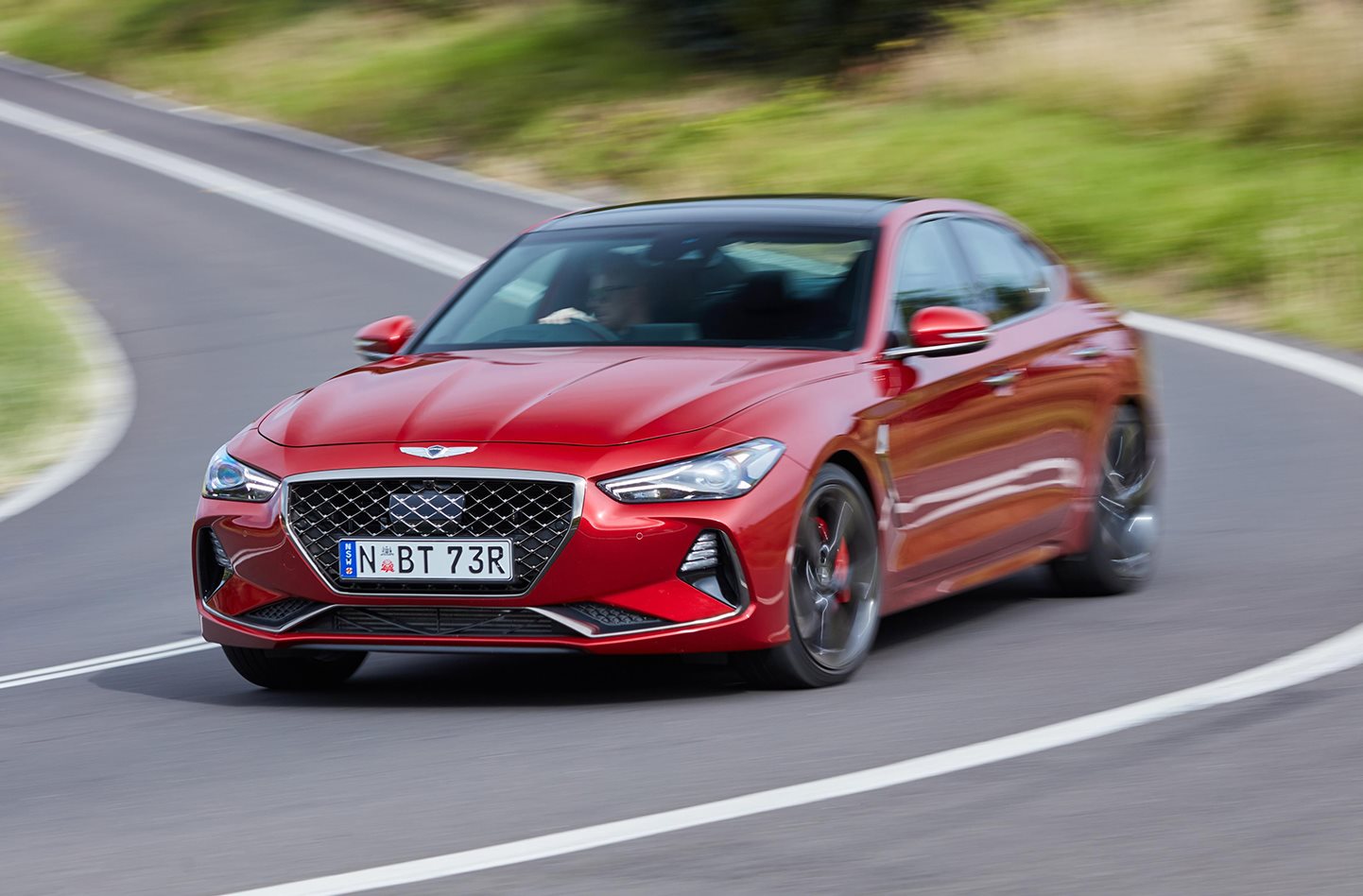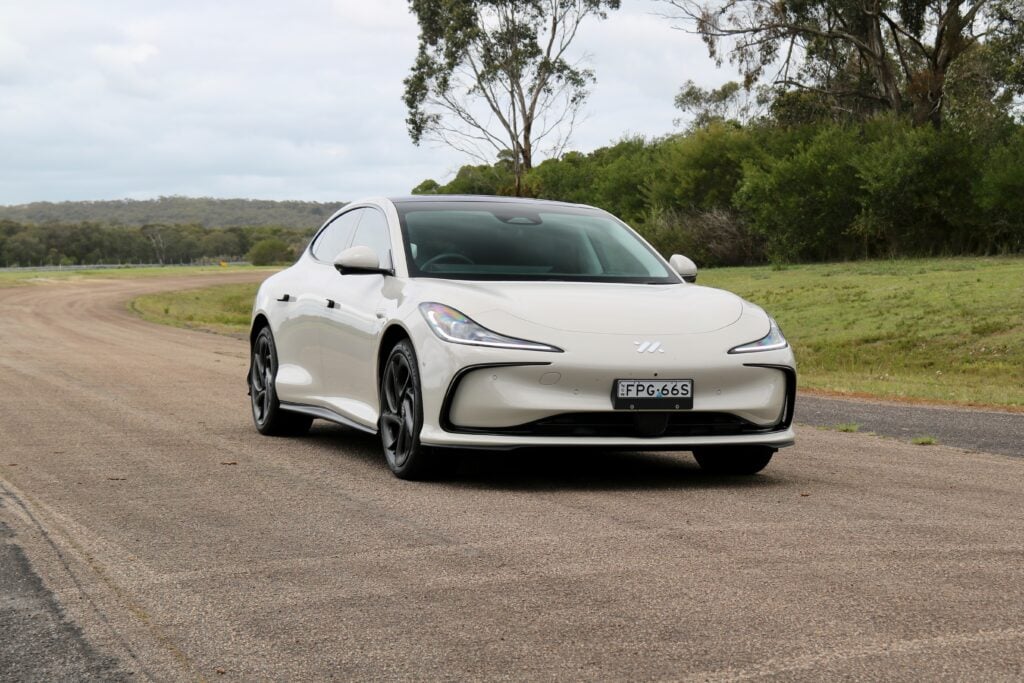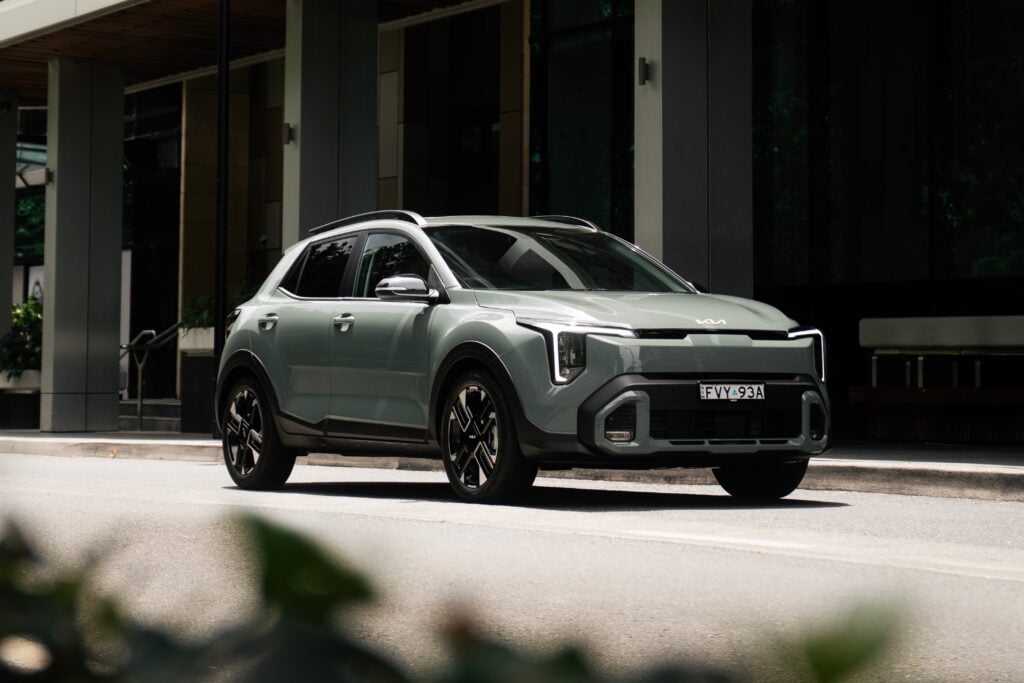
Score breakdown
Things we like
- Effortless V6 power
- Ride and handling, handsome styling
- Great after-sales package
Not so much
- Laggy transmission
- Infotainment looks basic
- Tight boot space
What stands out?
The Genesis G70 is a stylish and very well-equipped four-door sports sedan that has been designed to go head-to-head with European models such as the BMW 3 Series and Mercedes-Benz C-Class.It comes with a choice of 2.0-litre four-cylinder turbo or 3.3-litre twin-turbo V6 petrol engines, with the latter providing impressive performance. All versions are generously equipped and feature a sophisticated and spacious cabin that’s comfortable for long-distance cruising.
What might bug me?
People pointing out that your Genesis is actually a Hyundai as though you didn’t know, and that even in 2020 this is somehow still an issue.The Hyundai comments aren’t helped by the infotainment package that’s been lifted from the i30 hatchback. That said it’s a very intuitive system and comes with the lot.Driving at less than 80km/h on the space-saver spare, until you can fix your full-sized flat tyre.
What body styles are there?
Four-door sedan only. The Genesis G70 drives its rear wheels and is classed as an upper-priced medium car.
What features do all G70 versions have?
An 8.0-inch touchscreen with in-built satellite navigation and support for Apple CarPlay and Android Auto, which lets you display some smartphone apps and maps on the touchscreen and control them from there (or by voice).An MP3-compatible sound system with an AM/FM/Digital (DAB+) radio, auxiliary and USB inputs, Bluetooth audio connectivity, and at least six speakers.Wireless charging pad for compatible smartphones.A reversing camera with guide lines, and front and rear parking sensors.Eight-speed automatic gearbox with launch control, and paddle shifters on the steering wheel for hands-on gear shifting.Advanced driver assistance technology including autonomous emergency braking with forward collision warning system, lane keeping assist and driver attention alert, rear-cross traffic alert, blind-spot monitor.Seven airbags. Electronic stability control, which can help you recover from a skid and is mandatory on new cars. (For the placement of airbags, and more on G70 safety features, please open the Safety section below.)Adaptive cruise control, with Stop & Go function at slow speeds that allows your G70 to stop and start behind another vehicle in heavy traffic.Bi-LED headlights, LED daytime running lights, LED tail-lights, LED turn signals, and automatic high-beam assist.LED interior lighting.Smart key that opens and starts your G70 without having to take it out of your pocket or bag, hands-free boot opening, and remote window closing.Electric folding and heated door mirrors with side indicators and puddle lamps, and an auto-dimming rear-vision mirror.Dual-zone climate control, which allows you to set different temperatures for either side of the cabin. Air-conditioning vents for rear-seat passengers.Leather trim including genuine leather seats with powered front seats including four-way lumbar support, and heated front seats.Five drive modes – Smart, Eco, Comfort, Sport and CustomOne 12-volt power socket, and two USB phone charging sockets.Wheels made from aluminium alloy (which look nicer than steel wheels and are lighter).The Genesis G70 comes with a five-year, unlimited kilometre warranty.
Which engine uses least fuel, and why wouldn’t I choose it?
Two petrol engines are available in the G70: a 2.0-litre four-cylinder turbo and a significantly more powerful 3.3-litre twin-turbo V6.The 2.0-litre is marginally more fuel-efficient, using 8.7 litres/100km on the official test (city and country combined) in the G70 2.0T, and 9.0 litres/100km the 2.0T Sport and 2.0T Ultimate which are a little heavier because of their additional features.The main reason you would not choose this engine is that you want more even fun from your G70. The V6 has significantly more power, accelerates faster, and is far more entertaining to drive. It’s a bit thirstier, however, with an official fuel use figure of 10.2 litres/100km.The 2.0-litre engine experiences turbo lag, which means there’s a slight hesitation when you push the accelerator from a standing start as the turbo starts spinning to provide additional power. But once you get going, acceleration between gears is good.Every G70 drives its rear wheels through an eight-speed automatic transmission.
What key features do I get if I spend more?
Each engine is available with three specification grades, with the 2.0-litre versions being the most affordable.The least expensive G70 is the 2.0T that comes with a nine-speaker sound system, 12-way power settings for the front seats, 18-inch alloy wheels, as well as all the features common to each version.Stepping up to the 2.0T Sport beings bigger 19-inch alloy wheels with higher performance tyres, beefier Brembo brakes, sports leather seats with quilting and contrasting stitching and piping, additional sports instrumentation, black headlining, and more aggressive exterior styling.The 2.0T Ultimate adds fancier Nappa leather upholstery, 16-way driver’s seat settings with memory function, power-adjustable steering column, ventilated front seats, heated outboard rear seats, heated steering wheel, and suede headlining. There’s also an 8.0-inch head-up display, 360-degree parking monitor, exterior auto-dimming mirrors, panoramic sunroof, and a 15-speaker premium surround-sound audio sound system with 600W amplifier.Spending more again on the 3.3T Sport brings the more powerful turbocharged V6 engine and all the features in the 2.0T Sport plus twin exhaust tips and performance-enhancing equipment including adaptive suspension, variable steering that tightens up in sport mode, and dynamic torque vectoring.The 3.3T Ultimate also gains the performance features and additional sports instrumentation as well as all the equipment found in the 2.0T Ultimate.The most expensive G70, the 3.3T Ultimate Sport, gains a host of dark-chrome exterior enhancements, a choice of Sport Grey or Sport Red Nappa leather interior trim, brushed-alloy pedals and dark grey wheels.
Does any upgrade have a down side?
Not really. Fuel consumption increases when going up from the 2.0T to the 2.0T Sport and 2.0T Ultimate, and again up to the V6 versions.
How comfortable is the G70?
Genesis is keen to point out that the G70 isn’t a performance car but a ‘luxury car with sporting ability’; which is a fair description.The interior levels across the spec grades exude a suitably premium feel in terms of materials and especially in equipment levels. The quality of dash materials is also excellent, and the cabin seems free of rattles and squeaks.The front seats accommodate a variety of body shapes, and the seats themselves are top notch, with loads of adjustment, and power extension of the under thigh section that brings a big thumbs up.The G70 rebukes the trend to move all minor controls to the infotainment screen, another move that will no doubt find plenty of supporters. The touch screen graphics are shared with most Hyundai and Kia models and are a bit on the basic side, though functionality is excellent.The overall dashboard architecture, which includes old-school analogue gauges, also lacks design flair but the detailing is very good and user friendly.The G70 rides urban bumps with a quality and assurance that shames some of its rivals and feels remarkably accomplished on the open road.
What about safety in a G70?
All G70 variants come with a full suite of active safety features including autonomous emergency braking (AEB), which works at city and highway speeds and detects vulnerable road users such as pedestrians and cyclists.AEB works in conjunction with forward collision control, which assesses the likelihood of you driving into an obstacle and alerts you, with the brakes automatically engaging to prevent or mitigate impact should you not react in time.Then there is the lane-keep assist, which uses a camera to detect lane lines on the road and automatically help you steer within them. Driver attention warning alerts if you are drifting laterally on a freeway – a sign of fatigue.Also included are blind-spot detection, which provides a visual warning in the door mirror of a vehicle in a blind-spot near one of the G70’s rear corners; and rear cross-traffic alert, which helps you avoid bingles when reversing out of car parks or driveways – warning you if another vehicle is about to cross your path.Other safety equipment includes stability control and seven airbags. There are airbags directly in front of the driver and front passenger; two outside the driver and front passenger to protect their upper bodies from side impacts; a knee airbag to protect the driver’s knees and curtain airbags that protect the heads of front and rear occupants from side impacts.A reversing camera is also standard, while the Ultimate and Ultimate Sport versions have a surround view camera that provides a top-down view of the parking area.The G70 received a range-wide five-star Australasian New Car Assessment Program (ANCAP) rating in 2018.
I like driving – will I enjoy this car?
Yes, even with the less powerful engine. The 2.0-litre turbo is backed by a traditional eight-speed auto that sends power to the rear wheels. The engine and transmission are well-matched and, despite some turbo lag, there’s more oomph on tap once you get going than its on-paper specs suggest.Its multi-link rear/strut front suspension system has been locally tuned to suit varying Australian road conditions and offers an excellent compromise between handling and ride comfort.With the 3.3-litre V6 turbo under the bonnet the G70 always feels as if it’s bursting with energy, with smile-inducing acceleration resulting in a claimed 4.7-second 0-100km sprint time. Even with the heavier engine it still strikes a wonderful ride/handling compromise and feels a lot more planted to the road than its Kia Stinger cousin.All V6 versions have adaptive suspension which doesn’t do a great deal more than the standard multi-link set-up apart from making the ride plusher in Comfort mode. Switching to Sport mode stiffens the suspension a little while also sharpening steering feel and throttle mapping.Paddle shifters allow for some self-shifting but only offer manual control for about 15 seconds before up-shifting to Drive. On bendy roads you’re better off just concentrating on pointing the G70 in the right direction and letting the automatic transmission do its thing.Overall it’s a refined package that is fun for sports driving while also being a great long-distance cruiser. There’s some wind rustle around the mirrors and tyre noise, particularly from the low-profile Michelin Pilot Sport 4 rubber underneath the super-spec versions.
How is life in the rear seats?
The G70 has comfortable rear seats but legroom is affected by the transmission tunnel hump on the floor, while and headroom is compromised for taller passengers.There are vents at the back of the centre console, and a USB socket.Two ISOFIX baby seat mounts are standard, and there’s a pull-down centre armrest.
How is the G70 carrying stuff?
For a mid-sized sedan the G70’s 330-litre boot is relatively diminutive, about 100 litres less than the BMW 3 Series, though the seats can be dropped to provide more room when required.
Where is the G70 made?
The Genesis G70 is built in South Korea at Hyundai’s Ulsan plant.
What might I miss that similar cars have?
Perhaps the prestige that comes with a European badge as with the Audi A4, BMW 3 Series, Mercedes-Benz C-Class, Jaguar XE, Alfa Romeo Giulia and Volvo S60.A digital dashboard that looks great and allows for custom displays as available in all European rivals and the Ford Mustang.The Mustang’s head-turning looks and driveway cred.Another sports sedan you may want to consider is the Lexus IS.
I like this car, but I can’t choose which version. Can you help?
The G70 330T Sport is the sweet spot in the line-up. It has the more powerful engine and the same performance kit as the Ultimate and Ultimate Sport versions along with mid-spec creature comforts.
Are there plans to update this model soon?
The Genesis G70 arrived in Australia in 2019 but had been available overseas since 2017, so we can expect some kind of update in 2021.
Score breakdown
Things we like
- Effortless V6 power
- Ride and handling, handsome styling
- Great after-sales package
Not so much
- Laggy transmission
- Infotainment looks basic
- Tight boot space



